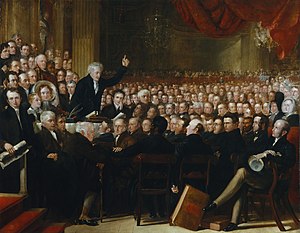Jacob Post
Jacob Post | |
|---|---|
 Post at the 1840 Anti-Slavery Convention. On his left is Lady Byron | |
| Born | 1774 |
| Died | 1855 Islington |
| Resting place | Winchmore Hill, Middlesex |
| Nationality | British |
| Known for | Writing |
Jacob Post (1774–1855) was an English Quaker[1] and a religious author. He wrote accounts of two founding Quakers: George Fox and William Penn.
Life[edit]
Jacob Post was born in Whitefriars, London, on 12 September 1774. His parents, John and Rosamund Post, enrolled him at the relatively new Ackworth School in Yorkshire, which was run by the Society of Friends.[2]
By 1787 Post had moved to Islington and was writing on behalf of the emerging evangelical section of the Quakers. In 1812 he founded a local section of the Bible Society for North London and Islington. In 1837, his eighteen-year-old son died. In the following year he published Extracts from the Diary of Frederick James Post under joint authorship.

In 1840 Post's portrait featured in a painting of the 1840 Anti-Slavery Convention in London.[1] His wife Elizabeth Post died in 1844; Post died on 1 April 1855 at his house in Islington.
Post's output includes two children's books, accounts of founders of the Society of Friends – George Fox and William Penn, the founder of Pennsylvania – and matters of religious dispute in his time.[2]
Works include[edit]
- Extracts from the Diary of Frederick James Post and other Manuscripts, with a Memoir (1838)
- Some Popular Customs amongst Christians questioned and compared with Gospel Precepts and Examples (1839)
- On the History and Mystery of (those called) the Sacraments; shewing them to be Jewish Institutions... (1846)
- The Bible: the Book for All (1848)[3]
- Popular Memoir of W. Penn (1850)[4]
- A Brief Memoir of George Fox... for the Information of Strangers (1854)
- The Lord's Supper its origin and history (1854)[5]
References[edit]
- ^ a b c The Anti-Slavery Society Convention, 1840, Benjamin Robert Haydon, 1841, National Portrait Gallery, London, NPG599, Given by British and Foreign Anti-Slavery Society in 1880
- ^ a b Charlotte Fell-Smith, "Post, Jacob (1774–1855)", rev. K. D. Reynolds, Oxford Dictionary of National Biography (Oxford, UK: OUP, 2004 Retrieved 19 January 2010.
- ^ POST, Jacob (1856). The Bible the Book for All. Second Edition.
- ^ Post, Jacob (1850). A popular memoir of William Penn. C. Gilpin.
- ^ Post, Jacob (1854). The Lord's supper; its origin and history: shewing that devotionally partaking of bread and wine is an ancient Jewish ceremony.
